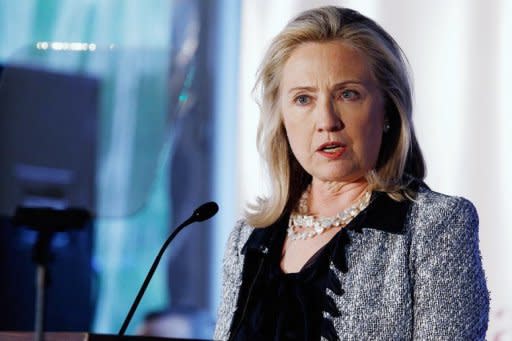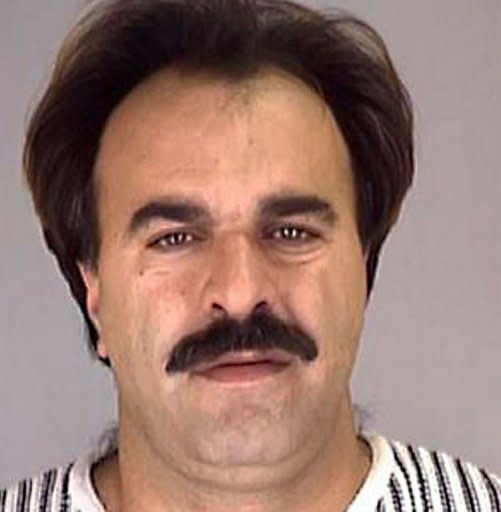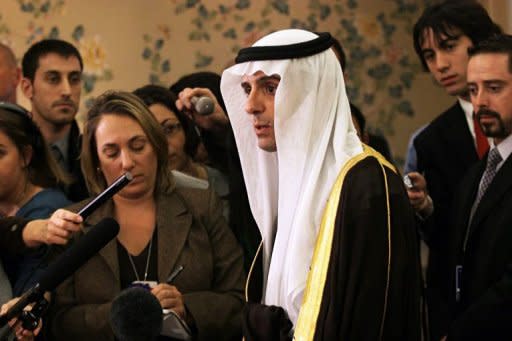US urges global action against Iran
The United States urged the world to take collective action against Iran on Wednesday, with Hillary Clinton labelling an alleged plot to kill a Saudi ambassador on US soil a "dangerous escalation." Iran said that the idea it schemed to kill Saudi Arabia's Washington envoy was deluded and accused the United States of fabricating the charge to distract from its domestic economic woes, amid growing anti-Wall Street protests. As US diplomats began consultations behind closed doors at the United Nations, Secretary of State Clinton rallied support for tough new measures against Iran, although it was not immediately clear what they might be. The US Treasury slapped sanctions on Mahan Air, a Tehran-based commercial airline accused of ferrying around the Middle East members of Iran's Islamic Revolutionary Guards Corps implicated in the ambassador assassination plot. The airline's assets in the United States were frozen and US citizens barred from doing business with the firm. "We call upon other nations to join us in condemning this threat to international peace and security," Clinton urged. "Iran must be held accountable" for "a flagrant violation of international and US law and a dangerous escalation of the Iranian government's long-standing use of political violence and sponsorship of terrorism." Iran strongly denied any involvement in an alleged plot by the Revolutionary Guards' elite Quds Force to kill the Saudi ambassador by hiring assassins from a Mexican drug cartel for $1.5 million. Announcing the stunning news on Tuesday, the US authorities named two principal suspects: Manssor Arbabsiar, a used-car salesman who is a naturalized US citizen, and Gholam Shakuri, said to be an Iran-based member of the Quds Force. Shakuri is believed to be in Iran, while Arbabsiar, 56, was arrested on September 29 at New York's John F. Kennedy airport and appeared in court Tuesday in Manhattan. His lawyer said he would plead not guilty, if charged. The Treasury Department on Tuesday froze the US assets of Shakuri and Arbabsiar, and three others, Qasem Soleimani, Hamed Abdollahi and Abdul Reza Shahlai, who it said were senior Quds Force officers involved in the plot. US officials say the case was broken open by a paid US source posing as a member of a Mexico-based drug cartel, which the defendants believed would provide explosives for the attack on the ambassador in Washington. Mexico said Arbabsiar was denied entry and put on a flight to New York, where he was arrested by US authorities. Iran, which faces four rounds of UN sanctions over its nuclear program, has sent a letter of protest to the Security Council accusing Washington of "warmongering." And in a mass rally carried on state television, Iran's supreme leader, Ayatollah Ali Khamenei, predicted that the Occupy Wall Street anti-corporate movement gripping New York would grow to "mark the downfall of the West." The United States has already imposed unilateral sanctions on Iran, on top of those from the UN, to pressure it to halt its suspect nuclear activities. Tehran denies accusations it is trying to build atomic weapons. France and Britain agreed to back US demands for further action at the United Nations, but criticism was notably muted from vital veto-wielding Security Council members Russia and China. Russia's UN ambassador Vitaly Churkin called the case "rather bizarre," while China was yet to comment at all. The US administration will be sending delegations to Beijing and Moscow to give details of the investigation, diplomats said. The Sunni-dominated Gulf Cooperation Council (GCC), which groups Bahrain, Kuwait, Oman, Qatar, Saudi Arabia, and the United Arab Emirates, said the alleged plot was "severely harmful" to Gulf-Iranian relations. A former chief of Saudi intelligence, Prince Turki al-Faisal, said the evidence pointing to Tehran's involvement was "overwhelming" and stated: "Somebody in Iran will have to pay the price." However, some experts remained skeptical that it involved or had the approval of high-level officials in Tehran. "It does not look like the ordinary way that Iran would carry out an assassination," said Rasool Nafisi, an Iranian-American scholar who studies the Revolutionary Guards. "Normally they would have a group planning this kind of operation. "I suspect this is not the work of the Iranian regime, when you look at the choice of target, timing of action and type of actor." Former Clinton spokesman Philip Crowley was also unconvinced, tweeting: "Could be just a couple of guys or a strategic decision by #Iran. We don't yet know." Saudi Arabia, the key US ally in the Middle East along with Israel, has frosty ties with Iran, a fellow OPEC member which it sees as attempting to become a regional superpower. Iran has criticized Sunni-ruled Saudi Arabia this year for lending military forces to Bahrain to help the tiny Gulf kingdom's Sunni regime put down pro-democracy protests by members of the Shiite majority.





